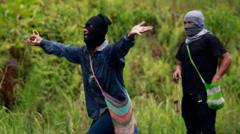**Panama's government has enacted a five-day emergency in Bocas del Toro, where protests escalated over pension cuts, leading to violence and unrest among banana workers.**
**Panama Faces Turmoil as Emergency Declared Amid Banana Region Protests**

**Panama Faces Turmoil as Emergency Declared Amid Banana Region Protests**
**Nation grapples with unrest stemming from pension reform backlash in agricultural heartland**
In response to escalating violence and unrest over proposed pension reforms, the Panamanian government has declared a state of emergency in Bocas del Toro, the country's primary banana-producing region. Reports indicate that shops have been looted and buildings vandalized during the ongoing protests, prompting authorities to suspend constitutional rights for the next five days. Under these restrictions, freedom of movement will be limited, and police are authorized to make arrests without warrants.
The unrest in Bocas del Toro began approximately a month ago, when the local banana workers' union joined forces in a nationwide protest against proposed pension cuts, subsequently declaring a strike. Minister of the Presidency, Juan Carlos Orillac, emphasized that the state is committed to preserving order and combating what he described as a systematic pattern of violence.
The protests, which originally ignited in March across Panama, have seen particular intensity around banana plantations owned by Chiquita Brands. After the company laid off thousands of striking employees, tensions flared further. Protesters have constructed roadblocks and have engaged in clashes with law enforcement, resulting in significant damage to both Chiquita facilities and local infrastructure.
The situation in Panama highlights ongoing socio-economic challenges as citizens mobilize against perceived injustices in pension reform and labor rights.
The unrest in Bocas del Toro began approximately a month ago, when the local banana workers' union joined forces in a nationwide protest against proposed pension cuts, subsequently declaring a strike. Minister of the Presidency, Juan Carlos Orillac, emphasized that the state is committed to preserving order and combating what he described as a systematic pattern of violence.
The protests, which originally ignited in March across Panama, have seen particular intensity around banana plantations owned by Chiquita Brands. After the company laid off thousands of striking employees, tensions flared further. Protesters have constructed roadblocks and have engaged in clashes with law enforcement, resulting in significant damage to both Chiquita facilities and local infrastructure.
The situation in Panama highlights ongoing socio-economic challenges as citizens mobilize against perceived injustices in pension reform and labor rights.



















